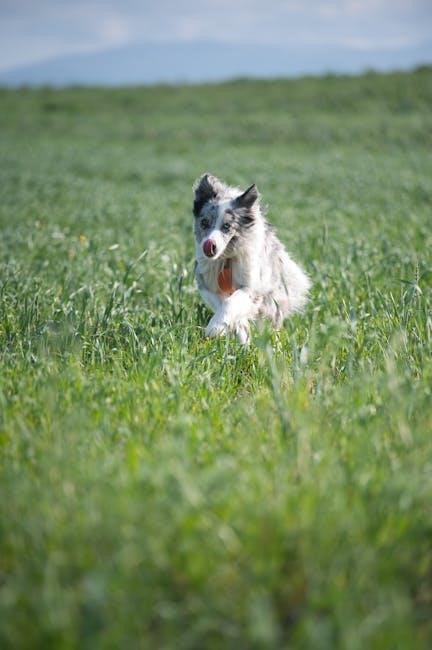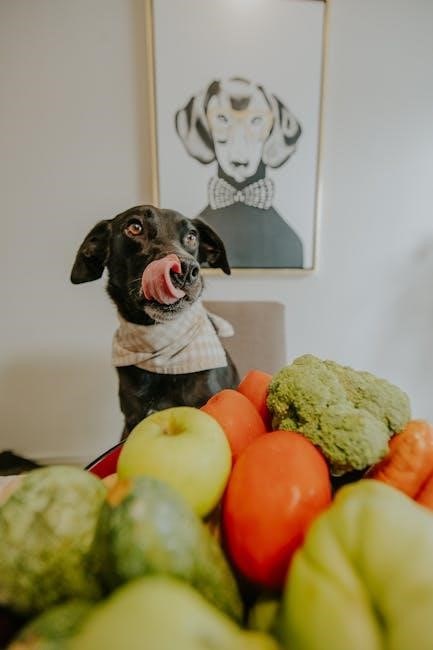Many common human foods, such as chocolate, grapes, and onions, contain toxins that can harm dogs. Awareness of these dangers is crucial to prevent accidental poisoning and ensure pet safety.

Why It’s Important to Know Which Foods Are Toxic to Dogs
Understanding which foods are toxic to dogs is essential for pet owners to prevent accidental poisoning. Dogs metabolize foods differently than humans, and even small amounts of certain substances can cause severe health issues or death. Common foods like chocolate, grapes, onions, and alcohol contain toxins that can harm dogs. Chocolate, for instance, contains theobromine, which can lead to heart and nervous system damage. Grapes and raisins have been linked to kidney failure in dogs, while onions and garlic contain compounds that can cause anemia. Alcohol consumption can result in coma or death. Awareness of these dangers allows owners to avoid risky foods and keep their pets safe. Additionally, recognizing the signs of poisoning early can lead to timely veterinary intervention, improving outcomes for affected dogs. Always opt for dog-safe treats and consult a vet if unsure about a food’s safety.

Common Foods Toxic to Dogs
Chocolate, grapes, onions, alcohol, and xylitol are among the most common foods toxic to dogs, potentially causing severe health issues or even death if ingested.
Chocolate and Its Dangers
Chocolate contains theobromine, a compound toxic to dogs. Dark chocolate and cocoa powder are the most dangerous due to higher theobromine levels. Ingestion can cause vomiting, heart issues, seizures, and even death. The severity depends on the dog’s size and chocolate type. Early veterinary treatment is crucial if poisoning is suspected.
Grapes and Raisins
Grapes and raisins are highly toxic to dogs, with even small amounts potentially causing severe health issues. The exact toxin in grapes is unknown, but ingestion can lead to acute kidney failure. Symptoms include vomiting, diarrhea, lethargy, and dehydration. The severity of the reaction depends on the amount consumed and the dog’s size. Immediate veterinary attention is critical if a dog ingests grapes or raisins. Pet owners should avoid leaving grapes or raisins within reach, as dogs may be tempted to eat them. It is also important to note that dried grapes (raisins) are equally, if not more, dangerous than fresh grapes. Never substitute grapes or raisins for dog treats, as the risks far outweigh any perceived benefits. If you suspect your dog has ingested grapes or raisins, contact a vet or pet poison hotline immediately for guidance.
Onions and Garlic
Onions and garlic belong to the Allium family and are highly toxic to dogs. They contain a compound called thiosulfate, which can damage a dog’s red blood cells, leading to anemia. Even small amounts, whether raw, cooked, or powdered, can cause severe health issues. Symptoms of onion or garlic poisoning in dogs include vomiting, diarrhea, lethargy, and difficulty breathing. In severe cases, it can lead to the destruction of red blood cells, resulting in life-threatening anemia. The toxicity is cumulative, meaning that repeated exposure over time can worsen the condition. It is crucial to keep all forms of onions and garlic out of your dog’s reach, including cooked meals and seasonings. If you suspect your dog has ingested onions or garlic, seek immediate veterinary care to prevent long-term health complications. Always opt for dog-safe ingredients and avoid sharing human food that contains these harmful compounds.
Alcohol
Alcohol is highly toxic to dogs, even in small amounts. It affects their central nervous system, liver, and pancreas, leading to severe health complications. Symptoms of alcohol poisoning in dogs include vomiting, drooling, difficulty breathing, and lethargy. In severe cases, it can cause seizures, coma, or even death. Dogs metabolize alcohol differently than humans, making even small amounts dangerous. Beer, wine, and spirits are all hazardous, as are products like mouthwash, perfume, and certain medications. If you suspect your dog has ingested alcohol, immediate veterinary attention is crucial. Keep all alcoholic beverages and products well out of your dog’s reach to prevent accidental ingestion. Always prioritize your dog’s safety by avoiding any exposure to alcohol, as the consequences can be life-threatening.
Xylitol
Xylitol, a sugar substitute commonly found in sugar-free gum, candies, baked goods, and toothpaste, is highly toxic to dogs. It triggers a rapid release of insulin, leading to hypoglycemia, which can cause trembling, seizures, and even liver failure. Symptoms can appear within minutes of ingestion. Xylitol is 20 times more toxic than chocolate, making it a critical threat. Dogs may be attracted to the sweet taste, increasing the risk of accidental ingestion. If you suspect your dog has consumed xylitol, seek immediate veterinary care, as prompt treatment is essential for survival. Always check food labels for xylitol and keep these products out of your dog’s reach to prevent intoxication. Awareness and prevention are key to protecting your dog from this dangerous substance. Never underestimate the risks of xylitol, as it can have devastating effects on your pet’s health. Always prioritize your dog’s safety by avoiding any exposure to xylitol-containing products.

Avocado

Avocados contain a toxic compound called persin, which can be harmful to dogs. While the exact toxicity varies depending on the part of the plant, the leaves, bark, and seeds are particularly dangerous. Ingestion of these parts can cause severe vomiting, diarrhea, and abdominal pain in dogs. The pit, or seed, poses an additional risk of obstruction if swallowed whole. However, the ripe avocado fruit itself is generally less toxic but should still be treated with caution due to its high fat content, which can lead to gastrointestinal upset or pancreatitis in dogs. If you suspect your dog has ingested any part of an avocado, it’s important to monitor their symptoms and consult a veterinarian immediately. Keep avocados and their pits out of your dog’s reach to prevent any potential harm. Always prioritize your dog’s health by avoiding the ingestion of avocado-related products. Awareness of these risks ensures a safer environment for your pet.
Nutmeg
Nutmeg is a common spice that, while safe for humans, can be toxic to dogs due to a compound called myristicin. Ingestion can cause tremors, seizures, and central nervous system damage. The severity depends on the amount consumed and the dog’s size. Small amounts can still lead to significant health issues. Dog owners should keep nutmeg and nutmeg-containing products out of reach. If ingestion is suspected, contact a veterinarian immediately for treatment. Early intervention is crucial to prevent serious complications. Monitoring your dog’s environment is essential for their safety and well-being.

- Nutmeg contains myristicin, toxic to dogs.
- Symptoms include tremors, seizures, and CNS damage.
- Keep nutmeg products away from dogs.
- Seek veterinary help immediately if ingestion occurs.

Macadamia Nuts

Macadamia nuts are highly toxic to dogs, though the exact mechanism of their toxicity is not fully understood. Even small amounts can cause severe symptoms, including weakness, depression, vomiting, tremors, and hyperthermia. These symptoms typically arise within 3 to 12 hours of ingestion and can last up to two days. The severity of the reaction depends on the quantity consumed and the dog’s size. While most dogs recover fully with supportive care, immediate veterinary attention is essential to manage symptoms and prevent complications. It’s crucial for dog owners to store macadamia nuts securely and be vigilant about their dog’s access to potentially harmful foods. Ensuring your dog’s environment is free from such hazards is vital for their health and safety.
- Macadamia nuts are toxic to dogs.
- Symptoms include weakness, vomiting, and tremors.
- Seek veterinary help promptly if ingestion occurs.
- Secure storage is essential to prevent access.
Safe Alternatives to Toxic Foods
Offering dogs safe, healthy treats like carrots, green beans, and apples ensures their well-being without the risks associated with toxic foods.

Healthy Human Foods Dogs Can Safely Eat
While many human foods are harmful to dogs, some can be safely incorporated into their diet. Carrots, green beans, and apples are excellent choices, offering nutritional benefits without risks. These vegetables and fruits are easily digestible and provide essential vitamins and fiber. Cooked sweet potatoes and pumpkin are also safe, aiding in digestion. Bananas and blueberries make great treats, though in moderation due to their sugar content. Always ensure to remove seeds, cores, and pits, as they can be harmful. Plain, unseasoned yogurt and peanut butter (free from xylitol) are also safe options. When introducing these foods, start with small portions to monitor your dog’s reaction and gradually increase their intake. Always consult your vet before making significant changes to your dog’s diet to ensure their specific needs are met. Properly preparing and portioning these foods helps maintain your dog’s health and safety.
Best Practices for Feeding Your Dog
Feeding your dog safely requires attention to detail and adherence to guidelines. Stick to high-quality dog food as the primary diet, ensuring it meets nutritional standards. Introduce human foods cautiously, confirming they are non-toxic. Avoid scraps, especially fatty or spicy items, to prevent digestive issues. Keep toxic substances like chocolate and alcohol out of reach. Always remove seeds, pits, and peels from fruits before offering them. Consult your vet before diet changes, especially for puppies or dogs with health conditions. Monitor your dog’s reactions to new foods to detect allergies or sensitivities early. Store food and waste securely to prevent accidental ingestion. Educate family members and guests about unsafe foods to maintain a safe environment. Regular vet check-ups help ensure dietary choices support your dog’s overall well-being. By following these practices, you can help protect your dog from potential harm and promote a healthy, balanced diet. Proper food management is key to their safety and longevity.
